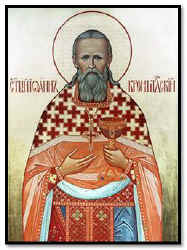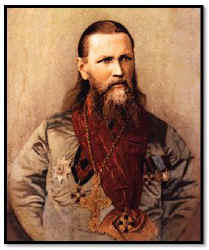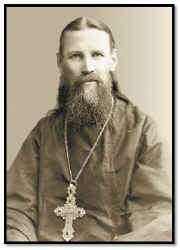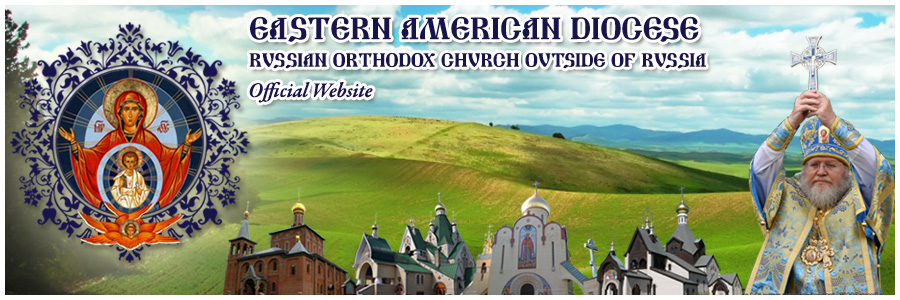Русская
Версия
Holy
Righteous John of Kronstadt on Prayer
We offer
you an excerpt from the sermon on the fortieth day after the
decease of Father John of Kronstadt by the New-martyr of Russia,
Metropolitan Seraphim Chichagov, who, in the course of thirty years, was
a spiritual son of the All-Russian pastor.
 Father
John had the greatest gift of prayer. This was his distinctive
characteristic. He profoundly believed with all his heart in the grace,
given to him as a priest by God, to pray for God's people, and that the
Lord is as close to the believing Christian as his own body and heart,
for our body is the temple of the Holy Spirit Who lives within us, Whom
we have from God (I Corinthians 6:19). He believed in prayer, that as
the shadow follows the body, the deed also follows the word, inasmuch as
with the Lord, word and deed are not separated, and, not allowing the
smallest doubt in the fulfilling of his petitions by God, he asked
completely simply, sincerely, as a child, with living, clear-sighted
faith in the Lord, representing Him not only standing before him, but as
though being himself in Him, in such closeness. He regarded doubt as
blasphemy against God, as an impertinent lie of the heart and said:
"Is it not enough for us to see impotence in men, that we want to
see impotence in God Himself as well, and we secretly think that God
will not fulfill our petition?!"
Father
John had the greatest gift of prayer. This was his distinctive
characteristic. He profoundly believed with all his heart in the grace,
given to him as a priest by God, to pray for God's people, and that the
Lord is as close to the believing Christian as his own body and heart,
for our body is the temple of the Holy Spirit Who lives within us, Whom
we have from God (I Corinthians 6:19). He believed in prayer, that as
the shadow follows the body, the deed also follows the word, inasmuch as
with the Lord, word and deed are not separated, and, not allowing the
smallest doubt in the fulfilling of his petitions by God, he asked
completely simply, sincerely, as a child, with living, clear-sighted
faith in the Lord, representing Him not only standing before him, but as
though being himself in Him, in such closeness. He regarded doubt as
blasphemy against God, as an impertinent lie of the heart and said:
"Is it not enough for us to see impotence in men, that we want to
see impotence in God Himself as well, and we secretly think that God
will not fulfill our petition?!"
When Father
John prayed, he tried in general to pray more for all the faithful than
for himself alone, not separating himself from the believers and being
in spiritual unity with them. If he saw shortcomings in a man or any
passions, he always prayed secretly for him, no matter where: while
serving the Liturgy, whether en route somewhere or in conversation. When
driving along the street and seeing wanton people, he would at once
raise up his heartfelt prayer to the Lord and cry: "O Lord,
enlighten the mind and heart of this Thy servant; cleanse him from
defilement!" - or with other words from the psalms more appropriate
to the given person. He would not let an occasion pass to pray for a man
at someone's request; he rejoiced at such a request, considering that
prayer for others is good also for him himself, because it cleanses the
heart, confirms faith and hope in God, kindles love for Christ and one's
neighbor. Father John prayed according to the faith of the petitioners
in his prayer and never ascribed anything to himself. If he had to
instruct the erring or comfort those that had fallen into despair, at
the end of the conversation he unfailingly invited those present to pray
together for that man, sincerely realizing that one cannot correct the
shortcomings of others by words alone, but one must obtain God's help
and power by prayer.
 A
characteristic of Father John's prayer feat lay as well in the fact that
he, with unusual attentiveness, watched the heartiness of his prayer and
would at once stop it for a time if he realized that the prayer was
becoming only external, mechanical, so to say. He would exercise himself
in the movements of his heart at prayer and thereby confirm that
characteristic of his spirit of which I spoke at the beginning.
Considering prayer that is only mental or superficial to be an affront
to God, Who calls mankind to Himself by the words: "My son, give me
thine heart" (Proverbs 23:26), Father John taught that it is good
to render obedience in all things to Mother Church, to read the long
prayers appointed by the Typicon and akathists; but one should do this
with good sense, and whoever can accommodate lengthy prayer - let him
accommodate it; but if this lengthiness is incompatible with fervor of
spirit, then it is better to make a short prayer, for as the Holy
Apostle says: "The Kingdom of God is not in word, but in
power" (I Corinthians 4:20). "While praying, we ought without
fail to take possession of the heart and turn it to the Lord, but never
allow even one exclamation to God which does not proceed from the depth
of the heart. When we shall learn during prayer to speak from the heart
only the truth - that which we actually realize and feel then sincere or
true prayer will cleanse our heart from falsehood and we shall not
permit ourselves to lie in life either" (...)
A
characteristic of Father John's prayer feat lay as well in the fact that
he, with unusual attentiveness, watched the heartiness of his prayer and
would at once stop it for a time if he realized that the prayer was
becoming only external, mechanical, so to say. He would exercise himself
in the movements of his heart at prayer and thereby confirm that
characteristic of his spirit of which I spoke at the beginning.
Considering prayer that is only mental or superficial to be an affront
to God, Who calls mankind to Himself by the words: "My son, give me
thine heart" (Proverbs 23:26), Father John taught that it is good
to render obedience in all things to Mother Church, to read the long
prayers appointed by the Typicon and akathists; but one should do this
with good sense, and whoever can accommodate lengthy prayer - let him
accommodate it; but if this lengthiness is incompatible with fervor of
spirit, then it is better to make a short prayer, for as the Holy
Apostle says: "The Kingdom of God is not in word, but in
power" (I Corinthians 4:20). "While praying, we ought without
fail to take possession of the heart and turn it to the Lord, but never
allow even one exclamation to God which does not proceed from the depth
of the heart. When we shall learn during prayer to speak from the heart
only the truth - that which we actually realize and feel then sincere or
true prayer will cleanse our heart from falsehood and we shall not
permit ourselves to lie in life either" (...)
Dear
Batiushka Father John struck and sometimes shook everyone by the
profundity of his prayer. On the basis of my conversations with him, I
can only thus depict his prayerful state. He stood before the Lord, as
before the sun, and, feeling the inexpressible brilliance of the divine
light, closed his eyes and manifestly perceived his being in the rays of
this light, and from them - warmth, joy and closeness to Christ the
Saviour. During prayer after communion of the Holy Mysteries, Batiushka
sometimes felt how He, after the Resurrection, passed through the walls
of the house to the Apostles, and then he received the consciousness
that his invisible soul is at rest in the invisible God.
But in order
to understand the faith and spirit of Batiushka Father John, it was
necessary to pray with him in the altar during the Liturgy. At the
beginning, he diligently commemorated all of the living and the dead at
the Table of Oblation, prayed with tears for everyone, boldly begged the
Lord for the afflicted and the suffering, at times went away, then
returned again and prayed anew, knelt, embraced the discos and visibly
suffered together with the people for whom he prayed. When the Liturgy
began, he still continued to commemorate at the Table of Oblation from
the numerous notes that were read to him, but for the reading of the
Holy Gospel he always returned to his place and listened with complete
attention to the word of God, carefully considering every word, nodding
his head as a sign of the immutability and truthful-ness of the Good
Tidings. At the transferral of the Holy Gifts to the Altar Table, the
great man of prayer began, as it were, to prepare for a joyful meeting
with the Lord and already thought more about those present in church,
about their participation in the common prayer and in the common joy
with him, and he sometimes prayed for them thus: "O Lord! Many of
those standing in Thy church are standing idle in their souls, as idle
vessels, and they know not for what it is fitting to pray; fill their
hearts now on this day of salvation with the grace of Thine All-Holy
Spirit and grant them to me, to my prayer, to my love, filled with the
knowledge of Thy goodness and contrition and heartfelt compunction;
grant them Thy Holy Spirit, Who makes intercession for them with
groanings that cannot be uttered!" (Romans 8:26). (...)
 In
performing the Liturgy, the unforgettable Batiushka found for himself
the greatest enjoyment and blessedness. "I am extinguished, I die
spiritually," he said, "when I do not serve in church for
several days, and I am enkindled, I am enlivened in soul and heart, when
I serve, forcing myself to prayer - not formal, but real, spiritual,
sincere, flaming prayer. I love to pray in God's church, in the holy
altar, at the Altar Table and the Table of Oblation, for I am
miraculously changed in church by God's grace; during prayer of
repentance and compunction, the bonds of the passions fall away from my
soul, and it becomes so easy for me. I die, as it were, to the world,
and the world, with all its good things, dies to me; I live in God and
for God, for the One God, and I am wholly penetrated by Him and abide
one with Him. I become like a child, comforted on the knees of its
mother; my heart is full of super-celestial, sweet peace, my soul is
enlightened by heavenly light. You see everything radiantly, you look at
everything correctly; concord and love are felt toward all, toward
enemies themselves, and you readily excuse and forgive them! O, how
blessed is the soul with God!
In
performing the Liturgy, the unforgettable Batiushka found for himself
the greatest enjoyment and blessedness. "I am extinguished, I die
spiritually," he said, "when I do not serve in church for
several days, and I am enkindled, I am enlivened in soul and heart, when
I serve, forcing myself to prayer - not formal, but real, spiritual,
sincere, flaming prayer. I love to pray in God's church, in the holy
altar, at the Altar Table and the Table of Oblation, for I am
miraculously changed in church by God's grace; during prayer of
repentance and compunction, the bonds of the passions fall away from my
soul, and it becomes so easy for me. I die, as it were, to the world,
and the world, with all its good things, dies to me; I live in God and
for God, for the One God, and I am wholly penetrated by Him and abide
one with Him. I become like a child, comforted on the knees of its
mother; my heart is full of super-celestial, sweet peace, my soul is
enlightened by heavenly light. You see everything radiantly, you look at
everything correctly; concord and love are felt toward all, toward
enemies themselves, and you readily excuse and forgive them! O, how
blessed is the soul with God!
"The
Church is truly an earthly paradise! What boldness you have toward the
Lord and the Theotokos! What meekness, humility and benignity! What
impartiality toward the earthly! What a burning desire for heavenly,
most pure, eternal delights! The tongue cannot speak of that blessedness
whereof you taste, having God in your heart! With Him everything earthly
is dust and decay."
Reproduced
from the website of
St. John the Baptist Cathedral in Washington
www.stjohndc.org


